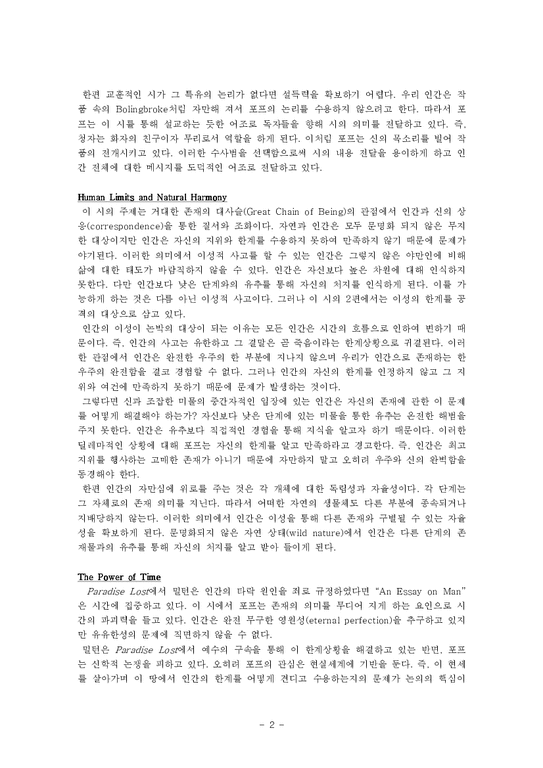
23/9/ · 'Hope springs eternal in the human breast' (I) writes Alexander Pope in his famous poem An Essay on Man. There's a good chance you've heard this quote before, which illustrates just how 1/7/ · An Essay on Man was written by Alexander Pope in and was published anonymously. The poem presents Pope’s most “extensive disquisition on philosophical, cosmic, and social themes” and sparked one of the greatest debates on “beneficence of Nature, and the role of individual society” 8/7/ · Analysis of Alexander Pope’s An Essay on Man By Nasrullah Mambrol on July 8, • (0) By the time Alexander Pope chose to publish his An Essay on Man (), he had received thorough and undeserved criticism from the poetasters, or “dunces,” whose activities he so often correctly lambasted, most notably in The Dunciad ().Estimated Reading Time: 7 mins
An Essay on Man, Alexander Pope - Words | Essay Example
This essay discusses the philosophy that Pope brings forth in his Essay that Man, in his pride and disbelief, is blinded and fails to realize the beauty and sublimity in the perfect world that God has created, rather it is Man who creates the dissonance and distortion to this seamless creation.
An Essay on Man was written by Alexander Pope in and was published anonymously. The Essay presents a contradictory situation through which Pope steers the readers between the new age of mathematical and scientific certainty and that of the older traditional ecclesiastic faith. Through the poem, Pope uses old ideas as a frame to bind, alexander pope essay on man, the modern thought of given instantaneous world in order to reconcile a notional map of Nature.
The expressed contradiction between man and Nature shows the intellectual weakness of man, alexander pope essay on man. Man, in his foolishness, alexander pope essay on man, searches for the mysteries of life that is safely kept in the intricate and flawless creation of the landscape architect. For all its intricacies, the creator has created the maze to perfection.
The description of the garden scene in the poem opens the contradiction that Pope talks of in the introduction to the Essay. Man creates a perfect, intricate maze and Pope compares it to the wild Nature created by God that apparently seems spontaneous and unplanned. He, thus, shows the pride in man through the description of the hunter who shows confidence at his complete knowledge of the quarry:.
Man is presented as the creator of disorder in the simple, unexploited, natural setting. Man, represented as problematic and divided, is not a harmonious dweller in the Nature God created.
Nature has found its repeated presence in the Essay. This makes one almost believe that Nature and God are intermingled to form a superpower. Nevertheless, reading the poem shows repeated reference of Nature indicates that the concept is not a mere personification.
These lines written in present tense metaphorically show the living Nature in the sun that participates in the godly action.
There is a contradiction in the deist believe expressed by Pope in the Essay. Whenever there is, a mention of the word Heaven or God there arises a conflict with Nature. When he calls God, he implies the almighty, superpower, which has planned it all. Nevertheless, when he says Heaven he brings in a personal touch to God who becomes a close companion and observer of all.
Pope in the Essay says that Nature, though Man believes that Nature is unplanned, keeps account of all its creations:.
In this delineation of Nature, God, heaven, Pope actually tries to demonstrate the God keeps humans below and limits of human knowledge to reduce his suffering. God made the universe and makes it follow the principles He made, alexander pope essay on man.
This dualism of conceptualization of God and Nature is furthers in Epistle III where Pope discusses the historic moral development of man starting from the time be started living as the lord with simple cohabitation with Nature. After this couplet, Pope shows a new facet of Nature wherein he professes that Nature is the innocent face of Man before it was contaminated with the art to reason. Pope therefore, confuses the readers, as it becomes difficult to ascertain if reason is a foe or a friend to Man in his history of social and moral evolution.
The Essay shows that Superior creatures have a way of looking down upon the Inferior alexander pope essay on man, as Man looks down upon animals, which, amusingly are closest to the rational Nature. In Epistle II Pope speaks of this idea of the chain of Being:.
In his pride and perception of superiority, man becomes an object of mirth. Pope uses the example of Newton to show the innate interest in all Man to expand his rationality into Nature. Pope furthers the irony in the pride of Man in showing that the pride that man so dearly cherishes is alexander pope essay on man to him by none other than Nature, alexander pope essay on man. Following this, Pope reaches to the climax of his philosophy where he says that it is Heaven or Nature that supplies all that is necessary for the creation of the world, including goodness and virtue.
On the other hand, Man, ironically considers himself as the lord of all creation, fails to fathom that he too is created by Nature. Pope therefore says:. Here Pope reinforces the beliefs that Man is blinded in his pride, and fails to see that it is Heaven that is the master of all creation. The vanity that Man store is created by Nature. Pope shows that Nature created the world with utmost perfection and ceased to intervene in its diurnal motion.
Man blinded with pride thinks that he can unravel the mystery lying at the abyss of the world, but fails to realize that this intelligence, this pride, this vanity that he so self-obsessively cherishes is a creation of that nature he tries to trivialize.
Therefore, Pope in the Essay praises the beauty of the system that Nature rationalizes its creation. The love of self of man is dynamic and is directed through human passion and conduct along with reason. In this duality of passion and reason, passion has an upper hand. The Essay is a satire on the follies of man, but within its witticism and mirth, Pope skillfully presents a metaphysical philosophy that is difficult to neglect. Man has tried to control and recreate nature according to his own will.
However, Pope contends that Man fails to see that the one who planned it to alexander pope essay on man unplanned, Nature, created the world. Atkins, G. Cutting-Gray, Joanne and James E. Lawlor, Nancy K. Rogers, Pat. The Cambridge Companion to Alexander Pope. Cambridge, UK: Cambridge University Press, White, Douglas H, alexander pope essay on man.
and Thomas P. Need a custom Critical Essay sample written from scratch by professional specifically for you? certified writers online. Select a referencing style:. Learn More. You are free to use it for research and reference purposes in order to write your own paper; however, you must cite it accordingly. Removal Request. If you are the copyright owner of this paper and no longer wish alexander pope essay on man have your work published on IvyPanda.
GET WRITING HELP. Alexander pope essay on man This paper. Select a referencing style: Copy to Clipboard Copied! APA-6 MLA-8 Chicago N-B Chicago A-D Harvard.
Reference IvyPanda. Work Cited ""An Essay on Man", Alexander Pope. Bibliography IvyPanda. References IvyPanda. Copy to Clipboard Copied! Check the price of your paper. Stuck with your assignment? Do you need an essay to be done? How many pages words do you need? Let's see if we can help alexander pope essay on man Yes Other assignment.
Research Paper Report Case Study Assessment Discussion Board Post Other.
ESSAY ON MAN By ALEXANDER POPE
, time: 14:53Analysis of Alexander Pope’s An Essay on Man – Literary Theory and Criticism

1/7/ · An Essay on Man was written by Alexander Pope in and was published anonymously. The poem presents Pope’s most “extensive disquisition on philosophical, cosmic, and social themes” and sparked one of the greatest debates on “beneficence of Nature, and the role of individual society” 23/9/ · 'Hope springs eternal in the human breast' (I) writes Alexander Pope in his famous poem An Essay on Man. There's a good chance you've heard this quote before, which illustrates just how The work that more than any other popularized the optimistic philosophy, not only in England but throughout Europe, was Alexander Pope's Essay on Man (), a rationalistic effort to justify the ways of God to man philosophically

No comments:
Post a Comment